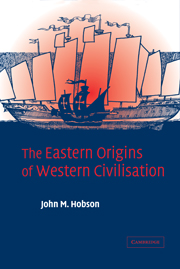Book contents
- Frontmatter
- Contents
- List of tables
- Preface and acknowledgements
- Map: Hobo-Dyer projection of the world
- 1 Countering the Eurocentric myth of the pristine West: discovering the oriental West
- I The East as an early developer: the East discovers and leads the world through oriental globalisation, 500–1800
- II The West was last: oriental globalisation and the invention of Christendom, 500–1498
- 5 Inventing Christendom and the Eastern origins of European feudalism, c. 500–1000
- 6 The myth of the Italian pioneer, 1000–1492
- 7 The myth of the Vasco da Gama epoch, 1498–c. 1800
- III The West as a late developer and the advantages of backwardness: oriental globalisation and the reconstruction of Western Europe as the advanced West, 1492–1850
- IV Conclusion: the oriental West versus the Eurocentric myth of the West
- Notes
- Index
6 - The myth of the Italian pioneer, 1000–1492
Published online by Cambridge University Press: 22 September 2009
- Frontmatter
- Contents
- List of tables
- Preface and acknowledgements
- Map: Hobo-Dyer projection of the world
- 1 Countering the Eurocentric myth of the pristine West: discovering the oriental West
- I The East as an early developer: the East discovers and leads the world through oriental globalisation, 500–1800
- II The West was last: oriental globalisation and the invention of Christendom, 500–1498
- 5 Inventing Christendom and the Eastern origins of European feudalism, c. 500–1000
- 6 The myth of the Italian pioneer, 1000–1492
- 7 The myth of the Vasco da Gama epoch, 1498–c. 1800
- III The West as a late developer and the advantages of backwardness: oriental globalisation and the reconstruction of Western Europe as the advanced West, 1492–1850
- IV Conclusion: the oriental West versus the Eurocentric myth of the West
- Notes
- Index
Summary
The Venetians, the Pisans, and the Genoese all used to come, sometimes as raiders … sometimes as travelers trying to prevail over Islam with the goods they bring … and now there is not one of them but brings to our lands his weapons of war and battle and bestows upon us the choicest of what he makes and inherits. … [For we have now established communications and arranged terms with them] such that we desire and they deplore, such as we prefer and they do not.
Salah al-din al-Ayyubi [Saladin], 1174Whoever is lord of Malacca has his hands on the throat of Venice.
Tomé PiresThe rise of a massive market economy in China during the eleventh century may have sufficed to change the world balance [against] command and [towards] market behavior in a critically significant way … and as Chinese technical secrets spread abroad, new possibilities opened in other parts of the Old World, most conspicuously in western Europe.
William H. McNeillEurocentric scholars place particular emphasis on the ‘post-1000’ commercial revolution (though as we saw in ch. 2, this revival in fact began in the post-750 period), as well as the navigational and financial revolutions. And we are told that behind all these breakthroughs was the genius of the pioneering Italians. As one scholar put it: ‘Even today, it is impossible to find anything – income tax for instance – which did not have some precedent in the genius of one of the Italian republics’.
- Type
- Chapter
- Information
- The Eastern Origins of Western Civilisation , pp. 116 - 133Publisher: Cambridge University PressPrint publication year: 2004



